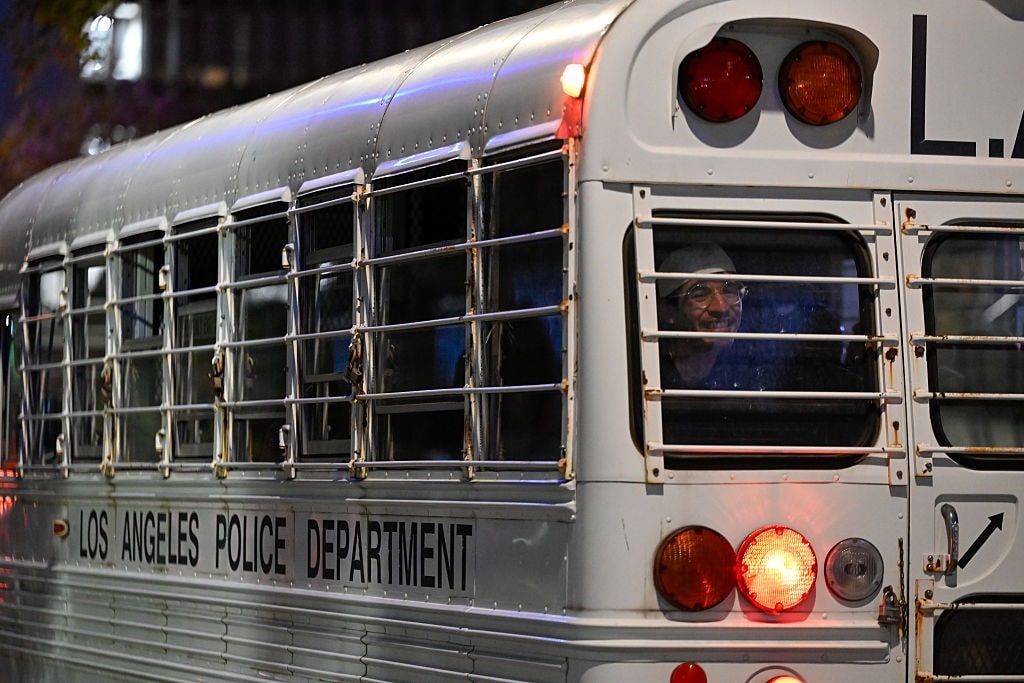
A district judge’s restrictions are struck down, but the case continues.
President Donald Trump was handed another victory on immigration – for now – by the Supreme Court. In a 6-3 decision on Sept. 8, the Court blocked a federal judge’s order that restricted how federal ICE agents in Los Angeles can conduct operations to find and detain illegal aliens. Perhaps not surprisingly, the three dissenting justices were those appointed by Democratic presidents. It seems that they split with the majority for primarily race-based reasons rather than legal concerns.
The Supreme Court’s ruling will allow Immigration and Customs Enforcement to continue its work in Los Angeles while the legal challenge moves through the Ninth Circuit Court of Appeals.
A Specifically Tailored Injunction
In July, US District Judge Maame Ewusi-Mensah Frimpong, a Joe Biden appointee, issued an injunction that prevented ICE from considering four specific factors when targeting people during immigration enforcement raids: gathering in certain locations, speaking Spanish or speaking English with an accent, race, and occupation. Essentially, then, the injunction was tailored to stop ICE agents relying on the very characteristics common among most illegal immigrants. Presumably, federal agents were still free to search for white, English-speaking illegals who worked in banks but not any others.
No majority opinion was attached to the Supreme Court’s ruling – which is fairly standard for opinions issued outside of regular Court sessions – but Justice Brett Kavanaugh did opine in writing. Kavanaugh particularly took issue with the threat of punitive action against ICE agents included in Frimpong’s order:
“The District Court’s injunction threatens contempt sanctions against immigration officers who make brief investigative stops later found by the court to violate the injunction. The prospect of such after-the-fact judicial second-guessing and contempt proceedings will inevitably chill lawful immigration enforcement efforts.”
The Trump-appointed associate justice also had a thing or two to say about the specific restrictions laid out in the injunction. Frimpong not only forbade ICE from acting on any of the four conditions she listed but also prevented federal agents from considering the presence of all four together. Thus, if ICE discovered that a group of Latino (or Hispanic) Spanish-speaking men were gathering in certain locations known to be places from which day laborers were hired, they still could not go in and conduct immigration sweeps. Kavanaugh pointed out the obvious absurdity of this:
“That there is an extremely high number and percentage of illegal immigrants in the Los Angeles area; that those individuals tend to gather in certain locations to seek daily work; that those individuals often work in certain kinds of jobs, such as day labor, landscaping, agriculture, and construction, that do not require paperwork and are therefore especially attractive to illegal immigrants; and that many of those illegally in the Los Angeles area come from Mexico or Central America and do not speak much English.”
ICE Hands Tied
All the factors that would give ICE reasonable suspicion that some or perhaps all such individuals were illegal aliens could not be considered, either separately or together. Effectively, Frimpong had ordered ICE not to question or detain anyone who seemed as though they were or could very well be in the United States without authorization.
Beyond all of that, though, Kavanaugh made what was perhaps the most important point of all: “Especially in an immigration case like this one, it is also important to stress the proper role of the Judiciary. The Judiciary does not set immigration policy or decide enforcement priorities.”
Justice Sonya Sotomayor wrote the dissent. In one part of it, she seemed to assert that the Supreme Court had improperly developed an “appetite to circumvent the ordinary appellate process and weigh in on important issues.” Of course, the highest court in the land does not simply choose to intervene in lower court matters, though it can decline to hear appeals or even entire cases.
The Elephant in the Room Is Not Undocumented
Sotomayor went on to list several legal challenges brought against the Trump administration in the last few months. One could be forgiven, then, for suspecting that the Barack Obama-appointed justice believed the Court should have refused to even ponder the legality of any of the lower court injunctions issued to obstruct the administration. That would have left President Trump’s opponents free to bury his entire policy agenda under a mountain of challenges, while the Supreme Court simply watched from the sidelines.
“We should not have to live in a country where the Government can seize anyone who looks Latino, speaks Spanish, and appears to work a low wage job,” Sotomayor went on. “Rather than stand idly by while our constitutional freedoms are lost, I dissent.”
The proverbial elephant in the room is the decades-long flouting of US immigration law by not only millions of foreign migrants but also by elected officeholders at the federal, state, and local levels. Maybe the greatest injustice in all of this is that, while illegal aliens are now being forced to face the music, those officeholders are not.
Liberty Nation does not endorse candidates, campaigns, or legislation, and this presentation is no endorsement.

















